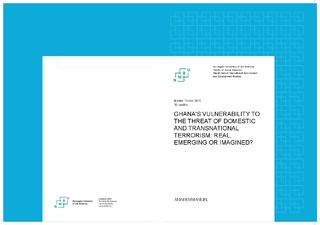| dc.description.abstract | Ghana is viewed as a relatively peaceful country in a sub region characterized by constant cycles of conflicts. Analysts have identified porous borders, drug, arm and human trafficking, terrorism, and other cross border crimes along the increasing levels of Islamist, insurgent and terrorist activities in the region as major security threats. For example, As Mali and Nigeria battle with the insurgency from Ansar din, and BH, respectively, the latter’s neighbors bear the brunt of the ongoing incidence. A survey on global terrorism trends had ranked Ghana as a country with no incidence of casualties
from terrorism between 1968-2006 (Sosuh 2011, p.14). Nevertheless, the recruitment of some Ghanaian graduates into the ranks of ISIL in August 2015 seems to contradict the pacifist notions about Ghana and susceptibility to terrorism a high possibility.
Drawing on literature about terrorism and radicalization, the thesis analyzes and discusses the level of Ghana’s vulnerability to the threats of domestic and transnational terrorism. The analysis reveals that Ghana’s susceptibility to the menace of terrorism is real, and gradually building up. Using Nigeria-based BH as a referent point, the study identified that Ghana’s security is threatened by the transnational aspect of the BH insurgency. The revelations that some Ghanaians could be swayed by the ideological influences and the activities of BH is becoming a reality. Other factors that add weight to the BH risk include but not limited to lack of inter-agency cooperation, the ECOWAS policy of free movement of people and goods, and weak borders. The study admonish Ghanaian authorities to closely watch current social, political, economic and
religious conditions such as poor governance, corruption, unemployment, poverty, and religious radicalization that could light the flames of terrorism in Ghana | nb_NO |
